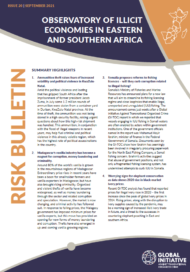Posted on 18 Sep 2018
Organised criminal syndicates drive collapse of South African abalone
96 million abalone poached in 18 years, new TRAFFIC report finds
Over the past 18 years, poachers have stripped South African coastal waters of at least 96 million abalone. Efforts to curb the illegal trade have roundly failed. Once abundant, the population of South African abalone Haliotis midae is declining at unprecedented levels. On average two thousand tonnes of abalone are bagged annually by poachers – 20 times the legal take – in an illicit industry estimated to be worth at least US$60-million a year.
These are just some of the shocking revelations contained in a new report, Empty Shells: An assessment of abalone poaching and trade from southern Africa, published today by TRAFFIC, the international wildlife trade monitoring network. The report is accompanied by a documentary that delves deep into the illegal abalone trade and its wider social context.
TRAFFIC is calling for stricter trade controls on South African abalone and a listing of the species on CITES1, the Convention that governs trade in endangered, threatened, and at-risk species.
Driven by sophisticated transnational criminal networks and local gangs, the illegal abalone trade has been fuelled by deeply entrenched socio-economic disparities in the Western Cape, bitterly contested fishing quotas, drugs, and gang violence.
Despite the very real threat that Haliotis midae could go extinct if poaching levels continue unabated, it is not currently listed on CITES and beyond South Africa the trade in Haliotis midae remains unregulated. That lack of regulation means that once abalone shipments have been smuggled out of South Africa to neighbouring countries, they can easily be laundered without fear of law enforcement action.
“Because of the involvement of organised crime, the apparent links to gangs in Cape Town, the links between the trade in abalone and the trade in drugs, there are also some clear negative socio-economic impacts associated with it. You have whole cohorts of people along the coast that are involved, and their work experience is only within an illicit economy.”



